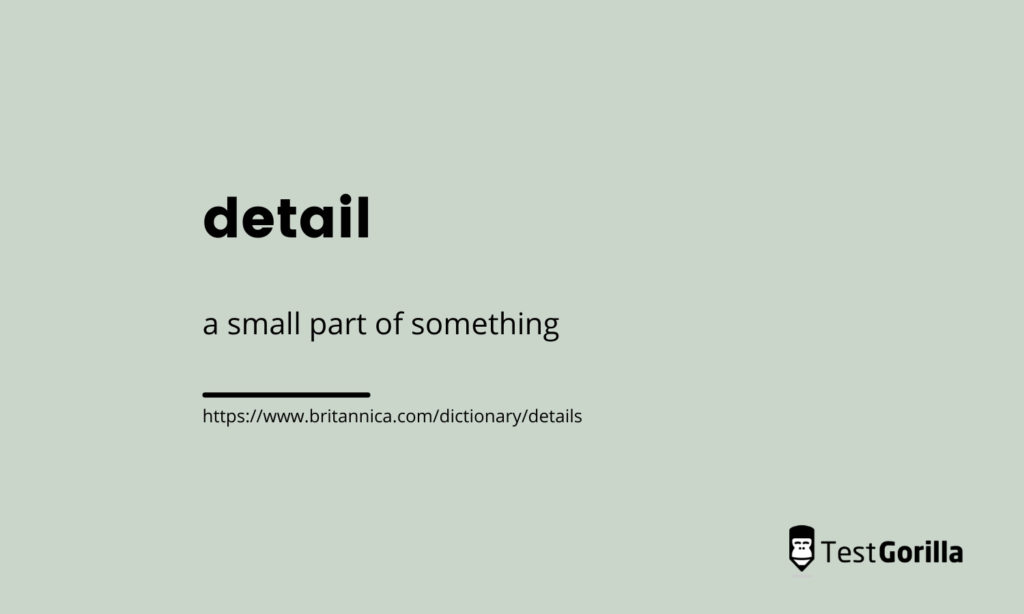Have you ever sent a text message without checking whether the dreaded autocorrect has swapped some words and completely changed the meaning of what you wrote? The internet is full of such hilarious mistakes, but attention to detail (or the lack of it) can be a serious matter.
Although some job roles depend on a high level of attention to detail under pressure, (air traffic controllers, emergency responders, etc.) it is one of the most valued qualities in any work environment, regardless of position. Everyone from a cleaner to a chief executive officer needs to be detail-oriented in order to do their job successfully.
We’re going to take a look at why this quality is crucial as a work-related skill, how you can evaluate it with an attention to detail test, and we’ll take you through the steps to build a balanced pre-employment assessment with an attention to detail test at the center.
Let’s get to it, and discover more about being detail-oriented and the TestGorilla Attention to Detail test.
Table of contents
- What is attention to detail?
- Why is attention to detail so important for employees?
- TestGorilla’s Attention to Detail test can help you evaluate candidates accurately
- How to create a thorough pre-employment assessment around the Attention to Detail test
- Effective ways to measure attention to detail in candidates alongside an assessment
- Attention to detail in candidates: What’s next?
What is attention to detail?
Detail-oriented people are driven to be thorough, accurate, and consistent when working on tasks and projects in the workplace and in their personal lives.
Not everyone has these skills by default, and when we’re under pressure or rushed even the best of us can make mistakes. Those with strong attention to detail will check and double-check to make sure those mistakes are found and corrected before they can cause an issue.
Why is attention to detail so important for employees?
Even small mistakes can cost money, reputations, and lives in the workplace. For instance, bad handwriting and one misplaced letter led to the loss of a fishing boat and the death of six fishermen off the coast of New Jersey in March 2009. Investigators discovered that illegible handwriting was the cause of a clerical error on the radio beacon registration form. The clerk thought the letter “C” was an “O”.
Mistakes that put others in danger are always the worst-case scenarios, but financial and reputational losses due to a lack of attention to detail can cause a lot of damage to an organization. Just ask the Pacific Bell Yellow Pages.
In 1988, Banner Travel Services in California placed an ad in the Yellow Pages. This ad promoted travel arrangements to exotic destinations. Someone at the Yellow Pages wasn’t paying attention when entering the ad copy, because the “x” in “exotic travel” became an “r,” and Banner Travel Services discovered that it was now unexpectedly providing “erotic travel” services.
Banner lost nearly 80% of its customers and suffered terrible damage to its reputation because of one tiny typo. In response, they sued the Pacific Bell Yellow Pages for gross negligence and were awarded more than $19 million in damages.
Detail-oriented employees deliver better work
“Done” is not better than “perfect” for staff with strong attention to detail. They don’t let tiny mistakes get past them, and they constantly strive for excellence. They can be trusted to work without close supervision because they don’t make mistakes or turn in sloppy work.
On the flip side, a careless employee either doesn’t notice the finer details or is indifferent to them. They rush to get things done, often thinking that quantity of work matters more than quality. Workers like this need extra supervision and their work has to be checked and perhaps fixed by someone else, which reduces productivity in the team and causes resentment.
Detail-oriented workers aim to refine their own workflows, to become even more efficient and produce consistent, high-quality work. They are great members to have on a team because they keep looking for ways to improve processes to help others to do better work.
Strengthen customer relationships
We all like it when people remember the little details about us. It shows us they care enough about us to notice, and you can build strong and lasting customer relationships if your team pays close attention to customer needs.
These strong relationships increase customer loyalty and engagement, which in turn strengthens your business.
Detail-oriented teams will also notice any changes in customer behavior or in their buying habits, and be aware of trends and key metrics.
The best insights on HR and recruitment, delivered to your inbox.
Biweekly updates. No spam. Unsubscribe any time.
TestGorilla’s Attention to Detail test can help you evaluate candidates accurately
Attention to detail is a measurable skill, and here at TestGorilla we have gone even further and created two different tests for specific types of attention to detail:
Attention to Detail test (Textual): This test evaluates candidates’ ability to pay attention to details in text while processing information. They are asked to check the consistency of information, to filter and match it, and to compare statements for differences.
Attention to Detail test (Visual): Applicants are judged on their ability to process visual information, as well as spot errors and small details in visual material. They are asked to find differences in images, match images, identify patterns, and distinguish design details.
We recommend that the Attention to Detail test is given to candidates as part of a pre-employment assessment at the start of the hiring process.
Perhaps skills-based hiring is a new concept to you, and you’ve always relied on resumes and interviews before. We’re here to help you make the transition from the time-consuming reading of hundreds of CVs to the quicker and more accurate method of skills-based hiring.
CVs are old-fashioned, inefficient, often inaccurate, and encourage hiring bias and discrimination. Skills-based hiring with an attention to detail test is a faster, fairer, and more accurate way to find employees with the skills you require.
How to create a thorough pre-employment assessment around the Attention to Detail test
Having your candidates take our Attention to Detail test is a great way to evaluate these essential skills, but for a more balanced view of an applicant, a pre-employment assessment is an important tool to use right at the start of your hiring process.
TestGorilla’s assessments consist of up to five tests, which are taken in one sitting by the candidate. If you want your applicants to take the Attention to Detail test, for instance, you can add four more tests to make up an assessment that suits you. The tests can be a mixture of role-specific skills tests, personality tests, a culture add test, or soft skills tests.
The aim is to give you a deeper understanding of the candidates’ technical strengths and weaknesses, how they approach work, their ability to communicate, and whether they will align well with your organization’s values.
Our assessments can be adapted with custom questions that you decide are relevant to the specific job role, and in the Culture Add test, the questions are based on a questionnaire that you fill out.
Worried that candidates may try and cheat on their pre-employment assessments? Don’t be. While the majority of candidates would never cheat, TestGorilla has a range of sophisticated measures to prevent cheating attempts.
In the next section, we’ll look at other ways to spot candidates with strong attention to detail. These methods are useful when used alongside the Attention to Detail test and a skills assessment to give you a more in-depth evaluation of their abilities.
Effective ways to measure attention to detail in candidates alongside an assessment
There are a couple of other ways to judge how detail-oriented a candidate is when used alongside our Attention to Detail test and assessments:
Work samples or portfolio
One way to back up the Attention to Detail test results is to ask the candidates for a work sample or portfolio of their previous work.
Not all job roles lend themselves to work samples, but for positions like graphic designers, photographers, writers, and computer developers, it’s a great way to assess the attention to detail and other skills that will be obvious in the quality of their finished work.
Interview questions
An interview is a great opportunity to see how detail-oriented your candidates are. They have to think on their feet and respond quickly to questions in an interview. This means they don’t have time to come up with the answer they think you want to hear instead of the one that shows their true nature.
Here are some attention to detail interview questions to consider.
How do you organize your daily workload?: Candidates who are detail-oriented are great at organizing time and tasks efficiently. This is an important question for remote workers and freelance roles, as they must manage their workload well.
Have you ever worked on a task or project where accuracy was crucial?: This question gets the applicant to tell you about their experience with work where attention to detail was essential.
Someone in your team makes a mistake in their work, and you are the one who spots it. How would you handle this situation?: This is a good one to ask, as it shows how a candidate deals with other colleagues making errors. It also gives you a good idea of how well they can give feedback, and how well-developed their communication skills are.
Tell me about a time you made a mistake at work. How did you discover your mistake, and what did you do to fix it?: We all make mistakes at work, even the most sharp-eyed and meticulous of employees. If they can admit a mistake, it’s a good sign that they can take responsibility for their errors. By telling you how they fixed the mistake, you get to see how well they solve problems and their methods for correcting errors.
Attention to detail in candidates: What’s next?
Attention to detail is important to varying degrees in every job role. Sure, attention to detail might not be as crucial to a cleaner as it is to a software engineer, but you still want them to be diligent and not miss things out or forget to empty the garbage bins.
It’s not always easy to assess such a broad range of skills that go into making up attention to detail, but being able to evaluate candidates to ensure they perform to a high standard is essential.
TestGorilla’s Attention to Detail test, when used as part of a pre-employment assessment, can help you find candidates who excel in this area. It’s a way of cutting down on time-to-hire and using data-driven results to help you make those hiring decisions.
Check out our pricing plans and find one to suit you, or sign up for a free TestGorilla account today to start building your assessments. If you would like more information on how TestGorilla can help with your hiring needs, book a free live demo with our sales team now.
You've scrolled this far
Why not try TestGorilla for free, and see what happens when you put skills first.




















